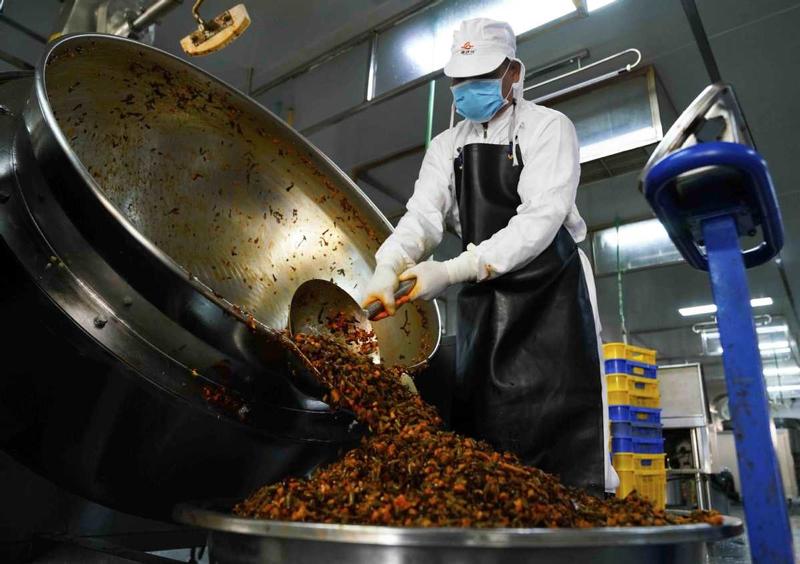 An instant food firm's employee works on a production line in Liuzhou, the Guangxi Zhuang autonomous region, on Feb 27, 2020. (PHOTO / XINHUA)
An instant food firm's employee works on a production line in Liuzhou, the Guangxi Zhuang autonomous region, on Feb 27, 2020. (PHOTO / XINHUA)
Instant noodles, frozen dumplings, wontons and glutinous rice balls are making a strong comeback as sales surge since the COVID-19 outbreak in China.
The reason is that they are convenient to cook and easy to preserve. Those features have won over people whose usual perception of the food is that they are "not fresh and healthy enough" to eat.
Frozen food and instant noodles are normally heated and do not require any cooking preparation. Shelves of instant noodles and frozen dumplings in many supermarkets have been emptied and manufacturers have sped up their production to meet rapidly growing demand.
Consumers have shown a rising demand for safe frozen food during the outbreak of the epidemic. Dumplings, wontons and glutinous rice balls of Wanchai Ferry have been quite well-received
Fan Qianlin, Public relations director of Wanchai Ferry
ALSO READ: Fast-food firms in China step up 'contactless' pickup, delivery
The Shanghai unit of General Mills, a United States manufacturer of branded consumer foods, became the first company to cooperate with the local government in the fight against the disease.
On the fourth day after the Lunar New Year, the company met the standard of resuming work under conditions of preventing the spread of the epidemic.
Now, its two plants in Shanghai and Guangzhou, Guangdong province, producing Wanchai Ferry, a frozen food brand owned by General Mills, have resumed production at full capacity. Its factory in Hebei province has resumed production at 70 percent capacity.
The company said it has seen rapidly increasing demand of online orders and home deliveries.
"With four days of production suspension, our plant in Shanghai resumed work again on Jan 28 to meet demand of consumers and epidemic prevention staff," said Fan Qianlin, public relations director of Wanchai Ferry.
"Consumers have shown a rising demand for safe frozen food during the outbreak of the epidemic. Dumplings, wontons and glutinous rice balls of Wanchai Ferry have been quite well-received," she said.
"We are closely following the demand in different areas and sped up production. We will also strengthen the recovery of our logistics distribution and online-to-offline business model."
Other major instant noodle makers like Tingyi (Cayman Islands) Holding Corp, which is more commonly known as "Kangshifu" in China, and Uni-President China Holdings Ltd, have gradually resumed production. Their suppliers are stepping up efforts in allocating raw materials, news portal Jiemian reported.
Uni-President said one instant noodle production line can make 10,000 to 12,000 packages daily. Given the severe conditions in Hubei province, plants in other areas have adopted some adjustments to meet the demand in Hubei, the company said.
Some of the hottest selling items on Taobao, an e-commerce platform of Alibaba Group, are rice noodles, self-heating hotpot and frozen dumplings. They are among the top five most popular food items.
READ MORE: Demand rising for contactless delivery
On JD, another major e-commerce site, sales of instant food jumped 3.5 times year-on-year in the first 10 days of the Spring Festival holiday.
In the past few years, sales of instant food declined in China following the rise of food delivery services. Since 2018, the government reduced subsidies to food delivery firms, and instant food makers started to develop new flavors and products. Sales of instant noodles started to pick up again.
In the first half of 2019, instant noodles sales grew 7.5 percent year-on-year in the country, according to Nielsen Holdings Plc, a data analytics firm.
Products that are easy to store, such as instant foods, will benefit in the short term, said a report by Hua Chuang Securities.


